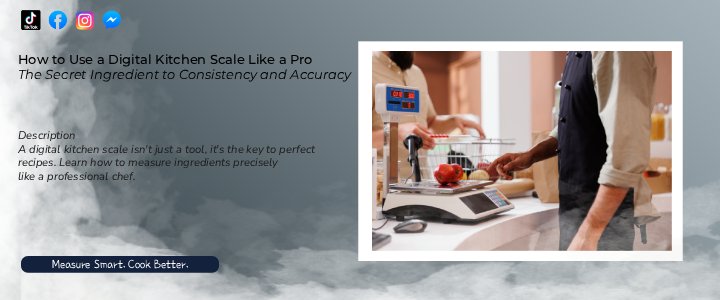When it comes to cooking and baking, accuracy can be the difference between success and frustration. While many home cooks still rely on measuring cups and spoons, professional chefs and bakers often turn to the precision of a digital scale. Both tools have their place in the kitchen, but understanding their differences can help you decide which one is best for your needs.
Let’s take a closer look at how a digital kitchen scale compares to traditional measuring cups, and why accuracy may be the secret ingredient to perfect meals every time.
Why Accuracy Matters in Cooking and Baking
Baking, in particular, is more of a science than an art. Small variations in ingredient amounts can significantly affect the outcome. For example, packing flour too tightly into a measuring cup can add up to 30% more flour than intended, which may lead to dense, dry baked goods. With a digital scale, you eliminate guesswork and measure ingredients by weight, ensuring consistency every time.
For cooking, the difference may not always be as critical, but precision can still improve flavor balance and portion control.
Benefits of Using a Digital Kitchen Scale
Here are the main advantages that make digital scales a favorite among serious cooks and bakers:
- Unmatched Accuracy
Digital scales measure ingredients to the gram (or fraction of an ounce), leaving little room for error. This is especially useful for baking recipes where precision is crucial. - Consistency Across Recipes
When you measure by weight, you can replicate your favorite dishes more reliably. Recipes become repeatable, even if you cook them months later. - Less Cleanup and Hassle
Instead of washing multiple measuring cups, you can place a bowl on the scale, tare (reset) it to zero, and add each ingredient directly. This saves time and reduces dishes. - Versatility for Any Ingredient
Whether you’re weighing flour, butter, or even liquid, a digital scale can handle it all. Many scales allow you to switch between grams, ounces, and milliliters. - Better for Portion Control
For those tracking nutrition or calories, weighing portions is far more accurate than guessing with cups or spoons.
As you can see, a digital scale is more than just a gadget—it’s a tool that can transform your cooking into a more precise and enjoyable experience.
Pros and Cons of Measuring Cups
While digital scales shine in accuracy, measuring cups still have their advantages in the right situations:
Pros:
- Widely available and inexpensive
- Easy to use for quick, everyday cooking
- Ideal for liquid measurements when weight isn’t critical
Cons:
- Can vary based on how ingredients are packed
- Less accurate for baking or calorie tracking
- More dishes to clean if using multiple cups
Measuring cups may work fine for simple family meals or recipes where precision isn’t essential. However, they can fall short when it comes to baking or portion control.
Which One Should You Use?
If you’re deciding between a digital scale and measuring cups, the answer often comes down to how you cook.
- Use a Digital Scale If: You bake often, want consistent results, or track nutrition closely.
- Use Measuring Cups If: You cook casually, prioritize convenience, or don’t need precise measurements.
For many kitchens, the best solution is actually to use both. A digital scale ensures accuracy when it matters, while measuring cups provide quick convenience for everyday cooking.
Conclusion
While both tools have their place, a digital scale is the clear winner for anyone serious about accuracy in the kitchen. It eliminates guesswork, saves time, and guarantees consistent results—whether you’re baking bread, preparing meals, or tracking portions.
Measuring cups may still be handy for quick tasks, but investing in a quality digital scale can elevate your cooking and baking to the next level. Think of it as upgrading from “good enough” to “just right”—a small change with big results.
So the next time you’re torn between the two, remember: for precision, consistency, and confidence in every recipe, the digital scale is your best bet.



